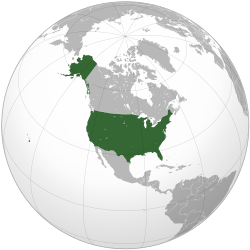United States' nuclear arsenal
| United States of America | |
|---|---|
 |
|
| Nuclear program start date | 21 October 1939 |
| First nuclear weapon test | 16 July 1945 |
| First fusion weapon test | 1 November 1952 |
| Last nuclear test | 23 September 1992 |
| Largest yield test | 15 Mt/63 PJ (1 March 1954) |
| Total tests | 1,054 detonations |
| Peak stockpile | 31,255 warheads (1967) |
| Current stockpile (usable and not) | 4,018 total |
| Current strategic arsenal | 1,900 methods of delivery (including ICBMs, bombers, and including MIRVed warheads on SLBMs ) |
| Cumulative strategic arsenal in megatonnage | ≈547 |
| Maximum missile range |
15,000 km (9,321 mi) (land) 12,000 km (7,456 mi) (sub) |
| NPT party | Yes (1968, one of five recognized powers) |
The United States was the first country to manufacture nuclear weapons, with help from the United Kingdom, Canada and Australia, and is the only country to have used them in combat, with the separate bombings of Hiroshima and Nagasaki in World War II. Before and during the Cold War, it conducted over a thousand nuclear tests and tested many long-range nuclear weapons delivery systems.
Between 1940 and 1996, the U.S. government spent at least $8.89 trillion in present-day terms on nuclear weapons, including platforms development (aircraft, rockets and facilities), command and control, maintenance, waste management and administrative costs. It is estimated that, since 1945, the United States produced more than 70,000 nuclear warheads, which is more than all other nuclear weapon states combined. The Soviet Union/Russia has produced approximately 55,000 nuclear warheads since 1949, France built 1110 warheads since 1960, the United Kingdom built 835 warheads since 1952, China built about 600 warheads since 1964, and other nuclear powers built fewer than 500 warheads all together since they developed their first nuclear weapons. Until November 1962, the vast majority of U.S. nuclear tests were aboveground. After the acceptance of the Partial Test Ban Treaty, all testing was relegated underground, in order to prevent the dispersion of nuclear fallout.
By February 2006 over $1.2 billion in compensation had been paid to U.S. citizens exposed to nuclear hazards as a result of the U.S. nuclear weapons program, and by 1998 at least $759 million had been paid to the Marshall Islanders in compensation for their exposure to U.S. nuclear testing.
...
Wikipedia
